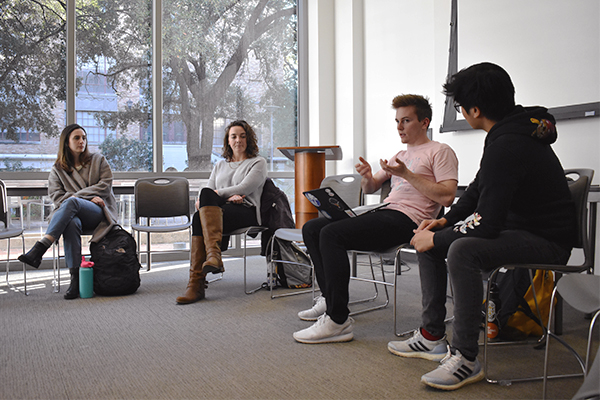Students gathered to voice opinions about a potential undergraduate collaboration between the College of Liberal Arts and the Lyndon B. Johnson School of Public Affairs on Wednesday.
The Liberal Arts Council hosted a focus group to gather ideas from students about a joint offering between the schools. The Bridging Disciplines Program currently offers a public policy certificate, but organizers think students need an academic program that allows undergraduate immersion into the field. Some of the town hall’s proposed implementations of this collaboration included a new certificate program and a five-year joint bachelors and masters degree program.
The idea of this possible collaboration came from Cameron Waltz, one of the event organizers. Noticing available graduate offerings for UT undergraduates in other departments, such as a 5-year integrated masters of public accounting program offered by McCombs, Waltz began brainstorming ways to create new programs for students interested in public policy.
“LBJ is one of the top 10 best public affairs schools in the country, and we have a growing (international relations and global studies) department,” said Waltz, a Chinese, Asian studies and international relations freshman. “I was thinking about ways that (Liberal Arts Council) could bridge the gap between those two.”
Some students reported learning a few details about public policy in certain classes but generally wish that undergraduates had more access to classes directly teaching about public policy.
“Health care is such a big and complex industry, and there’s a lot of policy that goes into it,” said Alexandra Calve, a health and society and sociology junior. “We learn about all the important acts and laws made within health care, but we don’t really go into a deep analysis of them. I wish we (had) more emphasis on concrete policy instead of just talking about it.”
Praveena Javvadi, one of the event organizers, shared a similar experience in her government courses. She said she also hopes a potential collaboration could provide more hard skills, such as public policy analysis and research, for future careers.
“Gov is really focused on theory, which is cool,” said Javvadi, a Plan II and government junior. “But I think sometimes as an undergraduate in gov, when you’re applying for summer internships (like policy research), you want to know those skills. What can be kind of frustrating as a government major, and a liberal arts student more generally, is a lot of the skills we develop are outside the classrooms.“





















